- About Us
- Columns
- Letters
- Cartoons
- The Udder Limits
- Archives
- Ezy Reading Archive
- 2024 Cud Archives
- 2023 Cud Archives
- 2022 Cud Archives
- 2021 Cud Archives
- 2020 Cud Archives
- 2015-2019
- 2010-2014
- 2004-2009
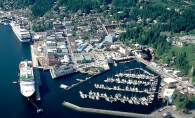 |
A Grand Adventure (and not a penny more) |
These are the rules for A Grand Adventure (and not a penny more):
1. All adventure destinations shall be outside the contiguous United States.
2. Round trip travel shall cost no more than $500.
3. The entire Adventure shall cost no more than $1,000, and not a penny more.
4. Any of the thousand dollars not spent on the Adventure shall be invested.
Americans love a good frontier. Somewhere in the source code of Americana is a rule that says our collective hairs will stand on end when we hear tales brought back from the edge, and that we will mythicize with fame or even infamy those Americans who have been there. The prestige we assign to frontiersmen and women is obvious in every chapter of American history from Manifest Destiny to the moon. But frontiers don’t last forever.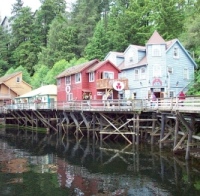 California is now the most populous state of the Union, and NASA cut the lunar program short when moon landings became second page news. After the west coast filled up and even after Americans crossed the frontier of outer space, there was still one more place to go. Alaska, the last frontier.
California is now the most populous state of the Union, and NASA cut the lunar program short when moon landings became second page news. After the west coast filled up and even after Americans crossed the frontier of outer space, there was still one more place to go. Alaska, the last frontier.
In the twenty-first century, though, it’s convenient to hop on a plane and fly to Alaska in a few hours, or fashionable to spend a few days on a luxurious cruise ship and then roll down the gangplank straight from the all-you-can-eat buffet. But don’t corrupt your own adventure; convenience and luxury are killers of frontiers.
Short of traveling to the forty-ninth state via human or animal power, the Alaska Marine Highway System provides the best opportunity to get across the frontier boundary. Because the ferry system is part of America’s federally-funded network of highways, it conducts its business mainly for transportation and not for leisure travel or entertainment—cabins cost extra. A ticket entitles the passenger only to deck space on which to erect a tent (secured to the deck with duct tape!) or a deckchair in the rooftop solarium. On the advice of an AMHS employee I spoke with on the phone, I chose the latter, since the buffeting winds have plucked at least one tent off the deck and into the sea (with possessions but sans occupants), and that would be devastating to a thousand dollar budget.
So with a sleeping pad and bag spread out on a chair, I spent a tranquil thirty-six hours watching my known world dip below the southern horizon or disappear behind the temperate rainforest peaks that rose from the waters of the Inner Passage. The scenery ahead grew more exquisite the farther north we motored, until it seemed we crossed a line in time.
Until the ferry reached Ketchikan, that is. Then I was snapped back to modernity at the sight of three cruise ships anchored bow to stern in front of a town whose residents couldn’t even fill the Cumberland County Civic Center for a sold out show. The cruise ships eclipsed a bulk of the town and towered over everything but the mountains. After I thought it through I felt naïve. In the twenty-first century, was I expecting hitching posts and saloon doors? Tabs paid with gold dust? Alaska is a state just like any other; its people want business and money and development and all the big box stores and coffee chains that come in the name of progress. But Alaska is also a state unlike any other, meaning this development comes with one hell of a view. 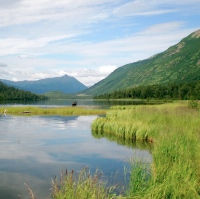
After disembarking from the ferry, I avoided the Newtown neighborhood where the leviathans cast their shadows and instead rented a bicycle and took it to Gravina Island. The island is only a few hundred yards across the Tongass Narrows from Ketchikan and is home to the town’s airport as well as about fifty people. Residents and airport both are served by a cheap, quick ferry that departs every half hour. Why am I telling you this? Because Gravina Island has something else as well. As I pedaled past the airport buildings, the paved road quickly ended at a gravel pile. Nearby there was a sign announcing the Gravina Island Highway, which I desperately wanted to find so I wouldn’t have to ride my bike over those rocks. To my dismay, the gravel was the highway, and the fist-sized stones punished my bike almost as much as they punished my butt. But with the airport soon behind me and nothing in view beside the environment and the gravel road, Gravina Island felt similar to the carriage roads in Acadia National Park—only everything was bigger.
After a couple of miles the road led to a dead end. The Gravina Island Highway, like Ketchikan’s abandoned bridge, goes to nowhere. I was at the end of the road that was built to feed the so-called Bridge to Nowhere, abandoned in 2007 as the multimillion-dollar piece of pork that it was. Today it’s an excellent place to sit and read a book, since the view isn’t ruined by a bridge taller than a cruise ship.
The next day I rose early to the sound of driving rain. I reached for my cell phone, which is usually off on Grand Adventures, to learn if the kayak fishing trip I had booked was still on. It was not. Ketchikan receives an average of twelve feet of rain per year—that’s one foot per month, or more than a third of an inch per day. Be prepared.
Since I was already awake, I suited up head to toe in rain gear and set off to Newtown. What I found was not what I expected in Alaska. It was like stepping into a theme park. There were several thousand people gawking at the manufactured joy of a real Alaskan town, waddling from shop to shop beneath neon signs to see what souvenirs best embodied their time in The Last Frontier. Their first purchases of the day, though, were flimsy, one-size-fits-all rain ponchos. Those ponchos must be a cash cow for the businesses of Ketchikan. You can tell a lot about a traveler by how well they’re prepared for the weather, and people who travel to a rainforest but aren’t prepared for the rain are not adventurers, to be sure. More than one person even asked me for directions, presumably because I looked like a local in my proper rain gear.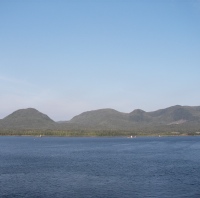 I couldn’t resist the temptation to just point in the opposite direction, make a few nonsensical hand gestures, and walk away with a wave. No harm done, they wouldn’t leave sight of their ships.
I couldn’t resist the temptation to just point in the opposite direction, make a few nonsensical hand gestures, and walk away with a wave. No harm done, they wouldn’t leave sight of their ships.
Newtown had little to offer someone of my tastes and means, so I decided to find some salmon. The sheltered waters of Ketchikan’s marina were thick with fish, so I started there. On the floating pier I found a commercial fisherman cleaning his portion of the catch. This is Alaska, I thought, and this is a modern frontiersman. It was pink gold he was after, the flesh of one of the world’s favorite fish, and he risked his life to pull it from the sea. Now, I’m very fond of my battered and worn Bean’s raingear. It and I have logged thousands of trail miles together, so compared to the other tourists’ ponchos, my gear was roughneck. But my authenticity paled in comparison to that of this man’s man. In oil and gut stained orange raingear and a trucker hat, the burly, bearded fisherman deftly reduced his fish to filets there under the cold rain.
As I watched him work I crossed that line in time again. In the Narrows just offshore floatplanes could be seen touching down and taking off from the sea. The salmon around the pier were so many that some were forced out of the water and upon the backs of others as the whole school ran into the bottleneck of Ketchikan Creek inside the marina. It was a trip from which they would not return. In the distance, Deer Mountain rose into the gray ceiling of clouds. And everywhere was the sound of a million millions of raindrops. For a moment, there was none of the ugliness or bled-out character of that unfortunate town. Unique experiences are the best reward of travel—wholly original situations that remind us how big this world is, and how many new experiences it can give us. Without them we’re left with the status quo, which doesn’t allow for growth. This was a seminal moment in my life. 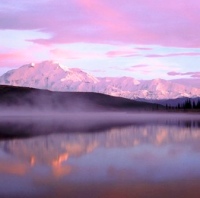
Until a cruise ship sounded its horn, that is. Then I was snapped back to reality, so I left Newtown in search of a hot meal and a few cold beers.
The next morning the rain had lessened, but not stopped. The best of Ketchikan thus far had been a gravel road and a pier, so I decided to continue the unpaved trend and hit the dirt of Deer Mountain, which rises three thousand feet from the landward side of town. At several points the trail diverged to a viewpoint, but the views were all obscured by clouds. In truth, I was okay with that. A few miles down into those clouds was a swarm of people killing a town one dollar at a time.
It got me thinking: so many of Ketchikan’s visitors never leave the shell of their comfort zone, and even seem to construct their entire vacation to far-off Alaska with little effort. It’s a choice, and choice is the root of freedom. You can choose to be one of nearly a million cruise ship visitors per year to a tiny—tiny—town, which makes you likely to spend your money at the businesses with little to no organic connection to the place, and your pictures and your souvenirs and your story will be virtually the same as a million other people every year. Or you can choose to take a different approach. Take with you just one thousand dollars. Then see how you would spend your time if it rains. Would you go to the movies and shopping centers, like you would at home? Or would you endure the elements all day like the men and women who made Alaska famous? Would you talk to the tour guide who shows you real Alaskan wilderness through a van window for a fee, or would you talk to a fisherman who tells you about his two decades catching salmon just to pass the time?
So many choose the former, so few the latter; so the frontier is gone. We killed it with our addictions to convenience and luxury. The frontier is gone, which means you can't get there no matter where you travel. But the frontier mentality in this country will never die, and if you want to find that, it depends entirely on how you travel. For that, there’s A Grand Adventure (and not a penny more).
Got a week? Got a passport? Got a grand? That's an adventure. For more information, please visit agrandadventureandnotapennymore.com.
